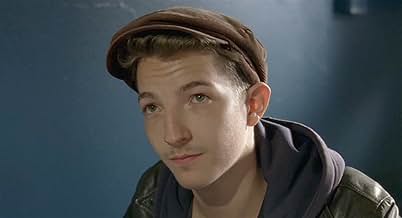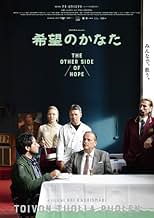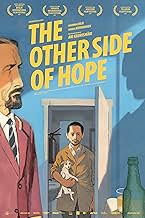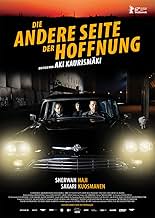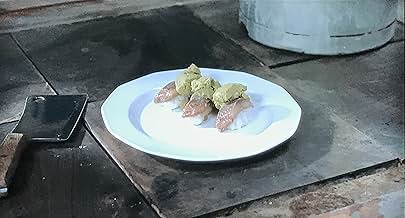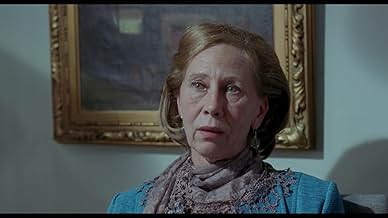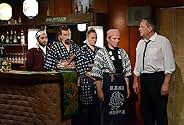AVALIAÇÃO DA IMDb
7,2/10
15 mil
SUA AVALIAÇÃO
Um dono de restaurante, jogador de pôquer e ex-caixeiro-viajante, faz amizade com um grupo de refugiados recém-chegados à Finlândia.Um dono de restaurante, jogador de pôquer e ex-caixeiro-viajante, faz amizade com um grupo de refugiados recém-chegados à Finlândia.Um dono de restaurante, jogador de pôquer e ex-caixeiro-viajante, faz amizade com um grupo de refugiados recém-chegados à Finlândia.
- Prêmios
- 8 vitórias e 24 indicações no total
Abdi Jama
- Aseman kassa
- (as Abdi alias 'Lii' Jama)
Simon Al-Bazoon
- Mazdak
- (as Simon Hussein Al-Bazoon)
Avaliações em destaque
Most of us have never had a 'refugee experience'. Many have read about it and some take a close interest, but usually it is something that happens to others in distant places. The confusingly labelled comedy-drama The Other Side of Hope (2017)is remarkably effective in bringing the refugee experience right into our face. Once seen, it is hard to regard it as only happening to nameless people in faraway lands.
The narrative frame has a haphazard quality about it, as if the audience has stumbled upon a vantage point from which we can see two hopeless lives randomly collide. After finally walking out on his alcoholic wife, dour Finnish salesman Waldemar (Sakari Kuosmanen) throws the sale proceeds from his business into a high-stakes poker game and makes a small fortune. After buying a run-down restaurant, he encounters Khaled (Sherwan Haji) sheltering among his rubbish bins. The Iraqi refugee had arrived in Helsinki via a coal-cargo ship while fleeing for his life. Refused refugee status and held for deportation by heartless Finnish authorities, Khaled is stateless, friendless, and homeless. Waldemar offers him work and shelter and tries to help him locate his sister who became lost while trying to escape the Syrian Civil War.
The story contains little humour. Its 'comedy-drama' label comes from totally deadpan performances that verge on absurdism, aided by a dark, almost noir filming palette. Most of the sub-titled dialogue is delivered without expression, which emphasises the heartless world into which the refugee is pushed. Dramatic situations that cry out for emotional expression are left cold, and it is this denial of the natural that most hits the viewer. For example, when the Finnish immigration official interviews Khaled for his refugee status, the honesty and sadness of his story are overwhelming yet not a trace of emotion is evident in either interviewer or interviewee. When Khaled is asked what he wants, the depth of his despair is in his words, not their expression: "I do not matter".
An element of the unexpected can add to the enjoyment of a movie, but perhaps not in this case. If you expect an entertaining comedy-drama from a nation well-known for its dark quirky humour you may be disorientated and possibly disappointed. The intention of this film is not to entertain, but to confront, inform, and engage. As global refugee problems continue unabated, The Other Side of Hope does not offer comfort or clarity, and this is reflected in its open-ended conclusion. The film's major achievement is how it makes us look directly into the face of the hopeless and hear the voice of the dispossessed. It leaves a heavy footprint.
The narrative frame has a haphazard quality about it, as if the audience has stumbled upon a vantage point from which we can see two hopeless lives randomly collide. After finally walking out on his alcoholic wife, dour Finnish salesman Waldemar (Sakari Kuosmanen) throws the sale proceeds from his business into a high-stakes poker game and makes a small fortune. After buying a run-down restaurant, he encounters Khaled (Sherwan Haji) sheltering among his rubbish bins. The Iraqi refugee had arrived in Helsinki via a coal-cargo ship while fleeing for his life. Refused refugee status and held for deportation by heartless Finnish authorities, Khaled is stateless, friendless, and homeless. Waldemar offers him work and shelter and tries to help him locate his sister who became lost while trying to escape the Syrian Civil War.
The story contains little humour. Its 'comedy-drama' label comes from totally deadpan performances that verge on absurdism, aided by a dark, almost noir filming palette. Most of the sub-titled dialogue is delivered without expression, which emphasises the heartless world into which the refugee is pushed. Dramatic situations that cry out for emotional expression are left cold, and it is this denial of the natural that most hits the viewer. For example, when the Finnish immigration official interviews Khaled for his refugee status, the honesty and sadness of his story are overwhelming yet not a trace of emotion is evident in either interviewer or interviewee. When Khaled is asked what he wants, the depth of his despair is in his words, not their expression: "I do not matter".
An element of the unexpected can add to the enjoyment of a movie, but perhaps not in this case. If you expect an entertaining comedy-drama from a nation well-known for its dark quirky humour you may be disorientated and possibly disappointed. The intention of this film is not to entertain, but to confront, inform, and engage. As global refugee problems continue unabated, The Other Side of Hope does not offer comfort or clarity, and this is reflected in its open-ended conclusion. The film's major achievement is how it makes us look directly into the face of the hopeless and hear the voice of the dispossessed. It leaves a heavy footprint.
There's no doubt about it, Aki is back once again with a wonderful film. "The Other Side of Hope" basically tells two stories. First there's an older Finnish man who opens a small restaurant. And then there's a Syrian man who finds his way to Finland in order to start a new life. As you can probably guess, these two stories find a way to connect. And in a surprisingly good and heartwarming way.
It was interesting to see the two cultures interact with each other. I love the kindness that so many characters bring with them. The film finds an excellent way to mix humour with drama while also bringing up some relevant issues. Many of the restaurant scenes are very funny and they made me laugh. While other scenes like when a character plays music from his homeland one final time before being deported almost brought a little tear to my eye. The entire thing is still packed with all the classic Kaurismäki elements. You can almost do a drinking game; "Point out all of Aki's personal tropes". I have to say that some of my favorite parts were whenever they were trying to change the restaurant in order to fit in with the modern times. It was almost metaphorical. It's like the filmmakers themselves had never changed, but the world around them did.
Timo Salminen's cinematography is on point with excellent use of framing and colors. I admire that they still use film instead of digital. Aki is very similar to Tarantino in that subject. He has said that if they weren't able to use film he would stop making movies all together. I hope this is not his final movie. I feel like he has many stories left to tell. I'll be here waiting for whenever a new one comes out, because I never get tired of the personality that comes with his work.
It was interesting to see the two cultures interact with each other. I love the kindness that so many characters bring with them. The film finds an excellent way to mix humour with drama while also bringing up some relevant issues. Many of the restaurant scenes are very funny and they made me laugh. While other scenes like when a character plays music from his homeland one final time before being deported almost brought a little tear to my eye. The entire thing is still packed with all the classic Kaurismäki elements. You can almost do a drinking game; "Point out all of Aki's personal tropes". I have to say that some of my favorite parts were whenever they were trying to change the restaurant in order to fit in with the modern times. It was almost metaphorical. It's like the filmmakers themselves had never changed, but the world around them did.
Timo Salminen's cinematography is on point with excellent use of framing and colors. I admire that they still use film instead of digital. Aki is very similar to Tarantino in that subject. He has said that if they weren't able to use film he would stop making movies all together. I hope this is not his final movie. I feel like he has many stories left to tell. I'll be here waiting for whenever a new one comes out, because I never get tired of the personality that comes with his work.
In modern-day Helsinki, the lives of two characters are followed: Waldemar (Sakari Kuosmanen) is beginning a new life as a single man and opening a new restaurant; and Khaled (Sherwan Haji) is a refugee from Allepo, Syria seeking asylum in Finland.
This film deserves credit for taking on a subject that continues to grab headlines and personalizes it. The Finns in this movie are mostly portrayed as generous and fair-minded with a few exceptions: some are seen as idiotic government bureaucrats (an international problem), and others are seen as downright nasty thugs (a bigger international problem).
The directing style by Aki Kaurismaki is in his usual style of being deliberately austere and distant with moments of dry humour. It works well mostly but there could have been room for a few moments of deeper emotion considering the subject matter.
A shocking twist at the end does give the film some jolt but the ambiguity of the situation (which is also far-fetched to a degree) is unsatisfying. Despite this, "The Other Side of Hope" is a fine film. As it focuses mostly on Khaled, Haji comes off as a very fine anchor for the movie. - dbamateurcritic
This film deserves credit for taking on a subject that continues to grab headlines and personalizes it. The Finns in this movie are mostly portrayed as generous and fair-minded with a few exceptions: some are seen as idiotic government bureaucrats (an international problem), and others are seen as downright nasty thugs (a bigger international problem).
The directing style by Aki Kaurismaki is in his usual style of being deliberately austere and distant with moments of dry humour. It works well mostly but there could have been room for a few moments of deeper emotion considering the subject matter.
A shocking twist at the end does give the film some jolt but the ambiguity of the situation (which is also far-fetched to a degree) is unsatisfying. Despite this, "The Other Side of Hope" is a fine film. As it focuses mostly on Khaled, Haji comes off as a very fine anchor for the movie. - dbamateurcritic
Saw this at the Berlinale 2017, where it was part of the official competition for the Golden Bear. The synopsis on the festival website was not really promising, but my prejudice disappeared gradually during the screening. Although the movie has a certain inclination to become a fairy tale where everyone will live happily ever after, the ending has some darker sides to downplay the assumed optimistic story. One of these darker sides lies in the several times appearing "Finland security" men, who are up to no good.
Our first main protagonist Khaled is seeking asylum in Finland. From the outside, it looks like a very clean process as far as shown to us. The idle waiting time related to the asylum application procedure does hide the rough edges we often read about, namely that asylum seekers among themselves are making trouble when seeing others with a different religion or other political position, or even worse when seeing GLBT behavior that they are not prepared to allow. Intolerance can be very problematic here, given that the people are packed together, while at the same time being bored to death, doomed to wait, unable to do anything useful. Due to their numbers and possible variations in asylum seekers, it is a sheer impossible task to sort and separate them in such a way that such troubles are prevented. In this movie, however, the asylum seekers are living harmoniously together, and help each other where they can without seeking favors in return. What does Finland do what we apparently are doing wrong in The Netherlands??
Our second main protagonist Wikström follows a completely different path. On a random morning, he leaves his wedding ring and house keys with his wife, who is clearly alcohol addicted. He sells his stock but keeps the storage space (will become unexpectedly useful later). What also proves useful is his poker face, and he succeeds in multiplying his amount of cash considerably, to the extent that he can buy a restaurant including staff. The capabilities of the restaurant staff that he takes over with the rest of the inventory and furniture, do not look very promising from the outset, but he keeps them nevertheless.
For the first 30 minutes or so, the stories of above two main protagonists run their completely separate course. We see them in turns, both paths clearly delineated, simply by having other people and another decor visible. After his asylum request being denied, and just before being transported to a plane to be sent back, Khaled escapes and starts an uncertain life on the street. He is found sleeping between the trashcans by fresh restaurateur Wikström, from which moment on their lives become mingled.
The restaurant business does not go as well as may be hoped. Given the quality of the staff that he inherited when buying the restaurant, it can be no surprise from the first day on. For example, when someone orders sardines from the menu, that seems to mean that he receives a half opened can. More humor follows later on when they try out different restaurant types, e.g. sushi being prepared out of a cooking book. Other experiments also hardly succeed. A surprise inspection is handled in a way not exactly by-the-book but they pass. These humoristic scenes are intermixed with the more serious main line of the story.
The story includes a series of lucky strikes and happy coincidences that is overwhelming, bordering on statistically impossible. But otherwise there would have been no story to tell, so who am I to complain. The musical fragments we witnessed, most in cafés or restaurants, even one where Khaled plays the sitar (is that the proper name?), albeit not relevant to the story itself, are included (I think) as ornamentation or as local folklore, or simply happened to be available and deemed a waste when left out.
All in all, this movie is much better than what the average synopsis promises. On the other hand, it is not easy to describe what it is exactly that makes the movie attractive. The serious undertone cannot be overlooked, given the hostilities encountered by Khaled, and the motivation for the denial of his asylum request is also a farce, based on wrong facts that we see refuted on TV, and gives Finland a bad name. However, the parallel story with Wikström and his restaurant takes good care of ample relief from the heavy material. I usually lower my expectations when a book or movie builds on two or more parallel story lines, by assuming that none of the stories could offer sufficient material to stand on its own feet, but this time my prejudice proved unjustified. The way both stories were mixed without disturbing the logical flow of events, may be one of the reasons this movie was awarded by the International Jury of the Berlinale 2017.
Our first main protagonist Khaled is seeking asylum in Finland. From the outside, it looks like a very clean process as far as shown to us. The idle waiting time related to the asylum application procedure does hide the rough edges we often read about, namely that asylum seekers among themselves are making trouble when seeing others with a different religion or other political position, or even worse when seeing GLBT behavior that they are not prepared to allow. Intolerance can be very problematic here, given that the people are packed together, while at the same time being bored to death, doomed to wait, unable to do anything useful. Due to their numbers and possible variations in asylum seekers, it is a sheer impossible task to sort and separate them in such a way that such troubles are prevented. In this movie, however, the asylum seekers are living harmoniously together, and help each other where they can without seeking favors in return. What does Finland do what we apparently are doing wrong in The Netherlands??
Our second main protagonist Wikström follows a completely different path. On a random morning, he leaves his wedding ring and house keys with his wife, who is clearly alcohol addicted. He sells his stock but keeps the storage space (will become unexpectedly useful later). What also proves useful is his poker face, and he succeeds in multiplying his amount of cash considerably, to the extent that he can buy a restaurant including staff. The capabilities of the restaurant staff that he takes over with the rest of the inventory and furniture, do not look very promising from the outset, but he keeps them nevertheless.
For the first 30 minutes or so, the stories of above two main protagonists run their completely separate course. We see them in turns, both paths clearly delineated, simply by having other people and another decor visible. After his asylum request being denied, and just before being transported to a plane to be sent back, Khaled escapes and starts an uncertain life on the street. He is found sleeping between the trashcans by fresh restaurateur Wikström, from which moment on their lives become mingled.
The restaurant business does not go as well as may be hoped. Given the quality of the staff that he inherited when buying the restaurant, it can be no surprise from the first day on. For example, when someone orders sardines from the menu, that seems to mean that he receives a half opened can. More humor follows later on when they try out different restaurant types, e.g. sushi being prepared out of a cooking book. Other experiments also hardly succeed. A surprise inspection is handled in a way not exactly by-the-book but they pass. These humoristic scenes are intermixed with the more serious main line of the story.
The story includes a series of lucky strikes and happy coincidences that is overwhelming, bordering on statistically impossible. But otherwise there would have been no story to tell, so who am I to complain. The musical fragments we witnessed, most in cafés or restaurants, even one where Khaled plays the sitar (is that the proper name?), albeit not relevant to the story itself, are included (I think) as ornamentation or as local folklore, or simply happened to be available and deemed a waste when left out.
All in all, this movie is much better than what the average synopsis promises. On the other hand, it is not easy to describe what it is exactly that makes the movie attractive. The serious undertone cannot be overlooked, given the hostilities encountered by Khaled, and the motivation for the denial of his asylum request is also a farce, based on wrong facts that we see refuted on TV, and gives Finland a bad name. However, the parallel story with Wikström and his restaurant takes good care of ample relief from the heavy material. I usually lower my expectations when a book or movie builds on two or more parallel story lines, by assuming that none of the stories could offer sufficient material to stand on its own feet, but this time my prejudice proved unjustified. The way both stories were mixed without disturbing the logical flow of events, may be one of the reasons this movie was awarded by the International Jury of the Berlinale 2017.
Aki Kaurismäki's film 'The Other Side of Hope' is really two films in one: the first, a deadly serious look at the life of a Syrain refugee in Finland, and the other, a deadpan comic look at the escapades of an unlikely restauranteur. Oddly, it works, with its direct abutment of light and shade, and its playful treatment of the legendary Finish characteristic of taciturnity. A nice element of the movie is it's use of music as a symbol of our common humanity. It's a simple film, but I liked it.
Você sabia?
- CuriosidadesThe actors playing siblings Khaled and Miriam are real-life siblings.
- ConexõesFeatured in Ismo Haavisto One Man Band: Midnight Man (2017)
- Trilhas sonorasOi mutsi, mutsi
Written and performed by Tuomari Nurmio
Principais escolhas
Faça login para avaliar e ver a lista de recomendações personalizadas
- How long is The Other Side of Hope?Fornecido pela Alexa
Detalhes
- Data de lançamento
- Países de origem
- Centrais de atendimento oficiais
- Idiomas
- Também conhecido como
- The Other Side of Hope
- Locações de filme
- Helsinque, Finlândia(The city)
- Empresas de produção
- Consulte mais créditos da empresa na IMDbPro
Bilheteria
- Orçamento
- € 1.600.000 (estimativa)
- Faturamento bruto nos EUA e Canadá
- US$ 183.943
- Fim de semana de estreia nos EUA e Canadá
- US$ 15.495
- 3 de dez. de 2017
- Faturamento bruto mundial
- US$ 4.282.973
- Tempo de duração
- 1 h 40 min(100 min)
- Cor
- Mixagem de som
- Proporção
- 1.85 : 1
Contribua para esta página
Sugerir uma alteração ou adicionar conteúdo ausente


